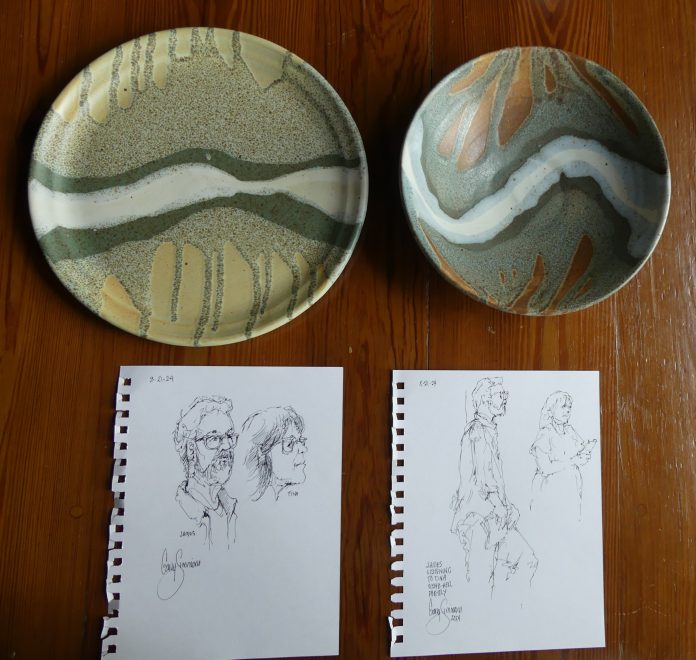I tell people, the gift of living in our glass cabin is how Hydrangea Ridge draws us outdoors to nature so that we might draw nature in. These ten acres have become the rhythm of our days and our writing.
The gift of touring with our book has been how folks draw us out, wanting to know about the creative life we’ve built. And how, in turn, they share with us the creative lives they are building for themselves and others.
Arkansas was a high point, having time to talk with Darlene about the quilts she makes, how quilt-making has been part of her life since she was young. She has a great eye for color. Getting to meet artist Gary Simmons, who sketched Tina and me while we read at Wednesday Night Poetry. And Kai Coggin, the WNP host, who has created a community where anyone is welcome to offer a poem or story, a song or joke they have made.
We got to spend time with the Larkins at Fox Pass Pottery. In their home, we sat around the Fisher stove that would get use this winter. Behind the woodstove is a wall of tiles Barbara made, each representing a bible story. We talked about dialect in the counties we knew, how words said are shaped by land and weather and class. Jim Larkin talked about teaching, about art with a small a. He liked to call it, “making things.” I said, “When my hands lift a board now, they hold it in place as if they have a mind of their own.” He said, “When you’ve done something so long, the hands are able to bypass the mind. And the work you do is not precious.” I said, “The work you do is the work that needs to be done, just that.” I tried to remember the lines from Seamus Heaney’s Glanmore Sonnets about “hankering after stone,/That connived with the chisel, as if the grain,/Rememberred what the mallet tapped to know.” What I did not know but am coming to understand — creativity, when attached to labor, gives us our surest route through impossible stone.
I think of everything as a river because Tina grew up on the Coosa, sees the world as Coosa, and when you love someone, how can you not begin to see the world the way they approach it, set their hands to it, and walk through?
Somewhere in the conversation with Jim Larkin, we found a common river. The room became quiet when the words ended like it does when you’re down in water that’s cold and replenishing.
It was like this everywhere we went in Arkansas.
